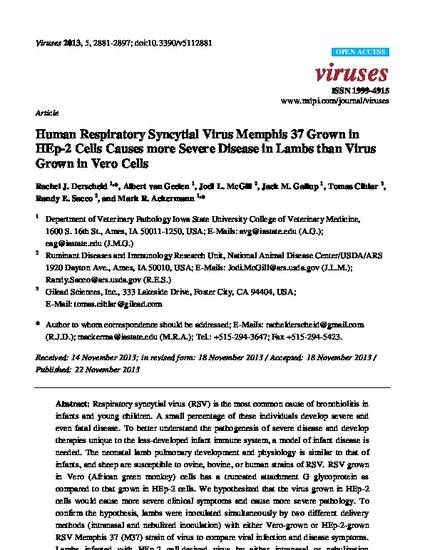
Article
Human Respiratory Syncytial Virus Memphis 37 Grown in HEp-2 Cells Causes more Severe Disease in Lambs than Virus Grown in Vero Cells
Viruses
Document Type
Article
Disciplines
Publication Date
11-22-2013
DOI
10.3390/v5112881
Abstract
Respiratory syncytial virus (RSV) is the most common cause of bronchiolitis in infants and young children. A small percentage of these individuals develop severe and even fatal disease. To better understand the pathogenesis of severe disease and develop therapies unique to the less-developed infant immune system, a model of infant disease is needed. The neonatal lamb pulmonary development and physiology is similar to that of infants, and sheep are susceptible to ovine, bovine, or human strains of RSV. RSV grown in Vero (African green monkey) cells has a truncated attachment G glycoprotein as compared to that grown in HEp-2 cells. We hypothesized that the virus grown in HEp-2 cells would cause more severe clinical symptoms and cause more severe pathology. To confirm the hypothesis, lambs were inoculated simultaneously by two different delivery methods (intranasal and nebulized inoculation) with either Vero-grown or HEp-2-grown RSV Memphis 37 (M37) strain of virus to compare viral infection and disease symptoms. Lambs infected with HEp-2 cell-derived virus by either intranasal or nebulization inoculation had significantly higher levels of viral RNA in lungs as well as greater clinical disease including both gross and histopathologic lesions compared to lambs similarly inoculated with Vero-grown virus. Thus, our results provide convincing in vivo evidence for differences in viral infectivity that corroborate previous in vitro mechanistic studies demonstrating differences in the G glycoprotein expression by RSV grown in Vero cells.
Rights
This article is an open access article distributed under the terms and conditions of the Creative Commons Attribution license (http://creativecommons.org/licenses/by/3.0/).
Copyright Owner
The authors
Copyright Date
2013
Language
en
File Format
application/pdf
Citation Information
Rachel J. Derscheid, Albert G. Van Geelen, Jodi L. McGill, Jack M. Gallup, et al.. "Human Respiratory Syncytial Virus Memphis 37 Grown in HEp-2 Cells Causes more Severe Disease in Lambs than Virus Grown in Vero Cells" Viruses Vol. 5 Iss. 11 (2013) p. 2881 - 2897 Available at: http://works.bepress.com/jack_gallup/6/

This article is from Viruses 5 (2013): 2881–2897, doi:10.3390/v5112881.